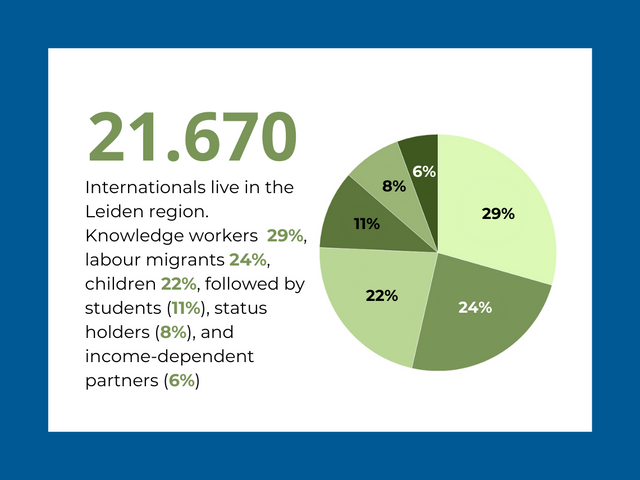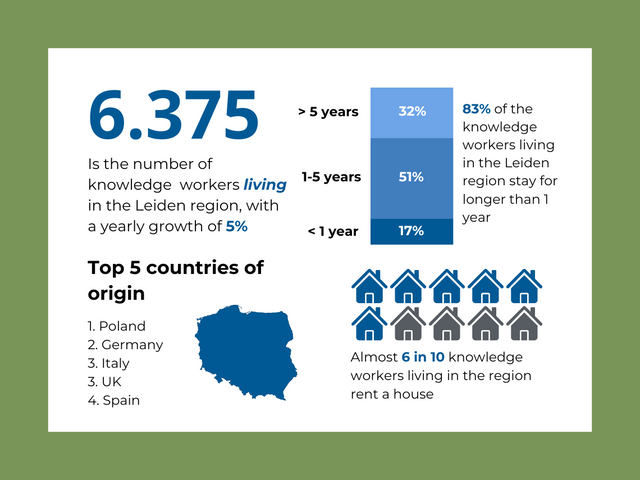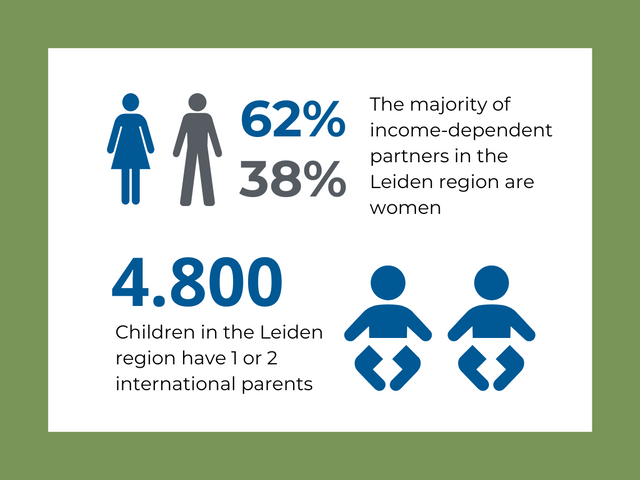Internationalisation in the Leiden Region
International Leiden
The Leiden region (Leiden, Katwijk, Leiderdorp, Oegstgeest, Voorschoten and Zoeterwoude) is an attractive location for newcomers with a total of 21,670 international residents.
Knowledge workers form the largest group of internationals living in the Leiden region with approximately 6,375 individuals, children come in third place (4,800) while income-dependent partners with a non-Dutch partner are the smallest community (1,215).
The other groups include labour migrants, status-holders, and students. Interestingly, the number of knowledge workers living in the Leiden region has grown on average by 5% per year between 2010-2022.

Knowledge Workers
Precisley 6,350 knowledge workers were working in the Leiden region as of 2022. This group has grown at an annual rate of 4.8% between 2010-2022. Knowledge workers in this report are defined by the IND's highly skilled migrant visa minimum salary criteria.
Salaries for knowledge workers increased between 2010-2022, which can be attributed to inflation. The percentage of knowledge workers earning 30-40k per year dropped from 29% to 17%. Around a third of knowledge workers earned between 50 and 70k per year in 2022.
Although salaries increased, knowledge workers in the Leiden region earn less when compared to the national average for knowledge workers.

In terms of industries, the majority of knowledge workers in 2022 were working in business services (19%) and education (19%). For comparison, the national average for knowledge workers in education is 7%. Healthcare is also a key sector for the region, with 9% of knowlege workers employed in this field compared to the national average of 5%. We can attribute this to the Leiden Bio Science Park and LUMC.
The Leiden region attracts a younger workforce: the majority of knowledge workers are aged between 25-35 (41%).
Between 2010 and 2022 the number of female knowledge workers grew significantly, by 6%. Now women represent 48% of the knowledge worker workforce - higher than the national average of 41%.
Looking at the nationalities of international knowledge workers, in 2022 Poland was the most common country of origin (17%), with Germany ranked second (11%), followed by the UK and Italy (both 7%).
A positive trend is that many of knowledge workers remain longer than a year in the Leiden region, with the largest segment staying between 1-5 years. This is good news for employers, and supports our observations at the Leiden International Centre: that many internationals see Leiden as a long-term home and wish to integrate and put down roots here.
56% of knowledge workers rent a house. Of those who own, the majority had a house valued between 400-600 thousand euros in 2022.

Income Dependent Partners
Decisio defines income-dependent partners as internationals aged 15-67 years old who are not economically active themselves, but have a non-Dutch partner who is economically active.
Leiden is home to 1,215 income-dependent partners. Although the number grew by 3.4% between 2010-2022, this is less than the national average of 5.3% growth.
The vast majority of income-dependent partners are women, in line with the national average. The largest group (35%) of income-dependent partners are between 35-45 years old.

Children
International children are defined in the report as children who have at least 1 international parent. The nationality of the child is not part of the definition.
The number of international children in the Leiden region between 2010-2022 grew by 2.7%. There are currently 4,800 international children residing in the region, with the majority of those (52%) living in Leiden.
The biggest trend to highlight is that most children have parents who are knowledge workers. In addition, there is a noticeable gap between children who have 1 or 2 international parents: 69% have 1 Dutch parent and 1 international parent, where as 31% have 2 international parents.